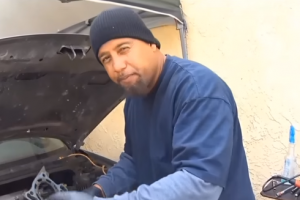Early Car Problem Detection Through Your Senses
Car Diy RepairsEmergency Situations
Driving your car may seem pretty cool but having basic knowledge about troubleshooting your vehicle really helps. You don’t have to have mechanic level understanding of your car.
Believe it or not, you can tell when something’s wrong just by using your senses – here’s how I do it:
Early Discovery Of Car Problems Prevents Major Issues
Sometimes, major issues on a vehicle can be prevented if only car owners paid more attention to their vehicle. Early discovery of car problems can be done with the help of regular maintenance. But sometimes, you just have to know your vehicle.
By using your senses, you can determine if there might be something wrong with your car. When you do, it is best to immediately bring your car to a mechanic for proper diagnosis. Sometimes, there’s an easy fix and most of the time ignoring the early signs just blows up the problem into bigger proportions.
Your sense of hearing, smelling, touch and sight can all help you identify the presence of a problem. Whether you know a lot about your cars or your just getting to know the basics, your senses will greatly help.
Sense Of Hearing
Start your car. Did it start or not? How does it sound? Although there are a few reasons your car won’t start, the sound it produces can give you clues on what problems your car might have.
Can you hear a weird squeaking sound when you turn the steering wheel? That can be caused by a variety of problems like damaged suspension or maybe worn-out ball joints.
You may also hear some popping, clicking or clanking sounds. These can be due to loosened hubcaps, low engine oil or drive belt issues. Also listen carefully to weird sounds when you step on the breaks or gas.
Any unusual sound is a sign that something may be wrong. Even if it’s just something loose, you should always bring it to a mechanic when you can’t pinpoint what it is and solve it.
Sense Of Smell
Do you smell exhaust inside your vehicle? That’s not normal especially when you got all your windows closed. This can be a sign there is something wrong under your vehicle.
The exhaust pipe runs under the car but the smoke shouldn’t be detectable inside the cabin. When this happens, immediately bring your car to a mechanic because there is a huge risk of suffocation due to the carbon monoxide in the exhaust gas.
Another scent to look out for is the scent of gasoline or oil. When you can smell these, your car may have a leak. Gasoline is highly flammable, not to mention expensive, so you should make sure those leaks are dealt with by your mechanic.
A scent of rotten eggs or sulfur is commonly present when the problem is due to the car’s batteries or catalytic converter. Sometimes, fuel can also cause this foul odor.
Burnt rubber or wood is a sign of having too much friction between parts. Friction causes heat which is why it smells like something is burning. This is usually present when you have issues with your clutch or brake pads.
A moldy scent on the other hand is a sign of problems with your air conditioning or air circulation system. Mold can be present in your air conditioning or heating system. There may also be something causing it inside the cabin such as leftover foods.
Sense Of Touch
Feel your vehicle while driving. Is it vibrating or are there parts that seem to be shaking? You can also observe how the steering wheel or other buttons and switches react when you use them. See if they respond correctly or have them checked when they don’t.
You should also fee if your having a difficulty in shifting gears or stepping on the gas or brake pedals. There can be a mechanical problem that can cause accidents when you don’t have them repaired immediately.
Sense Of Sight
Your sense of sight can be used to either find possible car problems or support what your other senses tell you. For example, you can use your nose to tell if you have a gas leak and you can confirm that by seeing puddles of gas underneath your vehicle.
The dashboard is also filled with warning lights that will switch on when it determines that there is a problem. It gives you lots of information about your vehicle like the following:
- Overheated engine
- Low fuel
- Low engine oil
- Bad battery
- Tire pressure
- Brake system and many others




